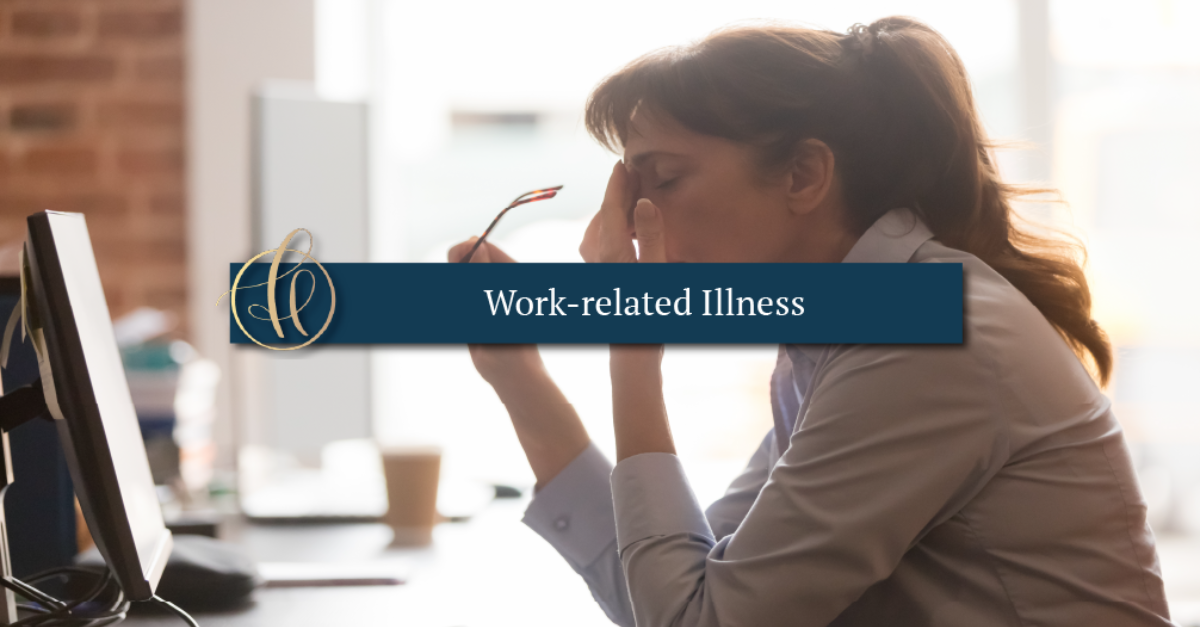Work related illnesses and occupational injuries can have a significant impact on your wellbeing, and impact your ability to make a livelihood. Occupational injuries or work-related illnesses that have been sustained during the course or duties of a person’s job can manifest in many different ways – and are usually dependent on the job that the person undertakes. In many instances, the injury or illness occurs as a result of an unsafe working environment, practices, or exposure to harmful substances during the course of their duties. If you are faced with an occupational injury or a work-related illness, it’s important that you are aware of your rights, and your ability to make a personal injury claim against the damage and impact.
What is a work-related illness?
A work-related disease is any illness that is caused or made worse by workplace factors, including diseases that have more complex causes that are a combination of occupational and non-work related factors (Source).
An occupational disease is any disease that is caused primarily by exposure at work to a physical, organisation, chemical or biological risk factor – or even a combination of these factors. Some occupational diseases will develop gradually as a result of prolonged exposure, while others may not manifest until years after the exposure. The latter can cause some challenges in establishing liability and proving negligence after a lapse of time. Queries may also be raised as to the date of knowledge or when the employee first became aware of their symptoms or illness for the purpose of the Statute of Limitations.
Many types of diseases such as cancer, respiratory disorders, cardiovascular disease, musculoskeletal disorders and mental health problems can be caused or made worse by work.
There are several workplace exposures that are known to contribute to the development or progression of a disease (Source):
- Dangerous substances: chemical and biological agents, including carcinogens
- Radiation: including ionising radiation and ultraviolet (UV) radiation from the sun
- Physical factors: vibration, noise, manual lifting and sedentary work
- Psychosocial factors: work organisational and psychosocial risk factors such as shift work, stress, and bullying
An occupational injury can encompass any harm or damage suffered by an individual as a direct result of their job or workplace environment. These injuries can range from slips, falls, or manual handling accidents, to more severe incidents like machinery malfunctions.
What can I do if I have suffered from a work-related disease or illness?
In cases where you believe that your work-related illness has been caused due to the negligence of another person or entity, you may want to seek compensation by seeking a personal injury* claim. In these cases you should:
1. Speak with a Solicitor
Your first step in making a claim should be to consult a solicitor, who can guide you through the process and protect your rights. They can also provide guidance in submitting your application correctly, procuring your medical report, and advise you on the assessment made by the Personal Injuries Assessment Board (PIAB). If you choose to take your claim to court, your solicitor can arrange for the necessary court proceedings to be drafted, and act as your legal representation. The responsible party will need to be contacted in writing.
A medical report will be required as part of your PIAB application, which can be provided by the practitioner who treated you. If you are unable to submit a medical report along with your claim application, you can speak to your doctor about getting a note with details of your illness. You could also choose to submit a copy of your hospital admission records. If none of these options are possible, you can still submit your application and follow up with the medical report at a later date. However, you must submit all relevant documentation within two years. Before assessing your claim, the PIAB may carry out an independent medical examination.
2. Fill out a Personal Injury Claim Application
Claims should be sent to the Personal Injuries Assessment Board (PIAB), with the exception of cases of medical negligence. If your claim relates to medical negligence, you can speak to a member of our team today to find out how we can assist you.
The PIAB is an independent statutory body that assesses “personal injury claims for compensation following road traffic, workplace or public liability accidents” (source).
To submit your claim, you should fill out the application form at piab.ie. You may also submit this form by post.
3. Submit Your Application
When you are submitting your form, you will need to include the processing fee as part of the required documentation. If you have medical documentation at this point, you should also include this. If you have suffered any financial losses due to the illness, you must also include these receipts with your application. You can include any other documents you feel are relevant.
Please note that your claim must be made within two years of the date on which you sustained the injury, per the Civil Liabilities and Courts Act 2004 (source).
Once the respondent allows the claim to be assessed by the PIAB, it can take over 7 months for a decision to be made. If your claim is taken to court, this will increase to 36 months. For claims assessed after 24 April 2021, the PIAB refers to the Personal Injuries Guidelines as a guideline for awarding personal injury* claims. (Source)
If you would like assistance regarding a work-related illness* claim, please contact our team at Martin A. Harvey & Co. Solicitors, and we would be happy to assist you in any way we can.
*In contentious business, a solicitor may not calculate fees or other charges as a percentage or proportion of any award or settlement.

